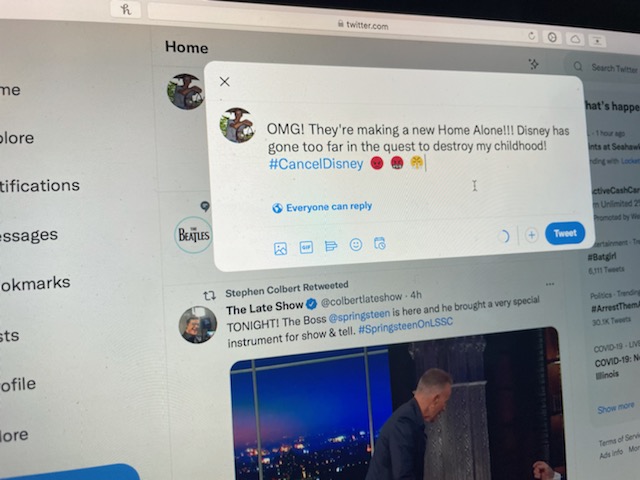Engaging with online negativity is unhealthy
A laptop screen shows someone writing a hateful post.
October 26, 2021
It’s hard to find something on social media that hasn’t received some form of hate, including Billie Eilish, Chris Pratt and even the new “Home Alone” reboot. It’s frankly become exhausting to see such negativity daily. While it’s nearly impossible to go without seeing something angering on social media, it’s important to remember that negatively engaging with people on social media is unhealthy and needs to stop.
The act of following someone that you don’t like is called “hate-following,” and it can affect anyone. While anyone can be hate-followed, celebrities have a bigger cultural reach and, therefore, receive more of these follows.
”Famous people often have special skills, talents, or other charismatic qualities, even if it’s just that they are beautiful or wealthy,” said Kerry Ferris, a professor of sociology at NIU. “That specialness attracts the rest of us.”
Social media can result in anger, with 25% of social media users reporting frequent anger, according to Pew Research Center. But this anger not only affects the people who read the hateful comments but also those who write them.
Ferris said what is posted by users on social media often relates to “impression management,” where people use forms of expression to direct how they are perceived. If you use social media to belittle and hurt others, it looks bad on your part.
Engaging in or being exposed to constant anger can result in stress, anxiety and depression. It can also increase the risk of a heart attack, stroke and high blood pressure, according to the University of Michigan’s Health Department.
Engaging with negativity online is the exact opposite of writing an angry letter and then throwing it away. Instead of privately expressing aggression and anger in a healthy way, it’s being dealt with in an unhealthy way that unwillingly involves others.
Some things absolutely deserve outrage, and social media can be a good tool to express that. This includes drawing attention to social issues like police brutality, climate change or LGBTQ+ rights. However, writing a nasty comment on the Facebook page of someone you disagree with isn’t helping. It hurts not just them, but yourself as well.
Now, people say nasty things on social media that they would never say out loud because they can hide through anonymity. But if you were in the room with a company or a person you’re claiming “destroyed your childhood,” “is an evil person” or “needs to die,” something tells me you wouldn’t say such things.
Part of it rests on you. Facebook may show posts that may infuriate you, but you choose whether or not to comment. You choose to let that anger consume you. Social media has enough negativity; don’t add on.














